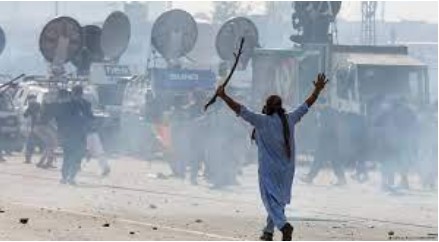By Sadia Mustafa Mughal
Pakistan is a country that has been plagued by political instability and crises since its inception in
1947. The country has faced numerous military coups, civil wars, and political assassinations. The
latest political crisis began in 2018 when the opposition leader, Imran Khan, accused the ruling
party of rigging the general elections. The opposition parties refused to accept the results, and the
protests began. The preceding year has witnessed a domestic crisis engulf Pakistan. Since the
ousting of Khan, the provisional government has fought a political battle for the future of the state.
The continued contention of Khan against this transitory government has exposed the dissolution
of the delicate power balance between Parliament, the Supreme Court, and the military that has
historically been a tenet of the state. The transitional government’s management of this situation
is beset by several domestic challenges that have disputed their tenure since its initiation. Most
notable are the extensive flooding and a potentially fatal financial crisis. Politics work fast and
unpredictably in Pakistan, and for the upcoming four months before the general election, anything
is possible. The stakes of control have never been higher.
The political crisis in Pakistan has had far-reaching impacts on the country’s economy, society,
and international relations. The crisis has led to a decline in foreign investment, a rise in inflation,
and a decrease in economic growth. The country’s society has also been affected, with increasing
political polarization and unrest. The international community has been closely monitoring the
situation, with concerns about the impact on regional stability.
Pakistan’s political instability can be traced back to its inception as a state in 1947. The country’s
founding father, Muhammad Ali Jinnah, died just a year after its creation, leaving behind a
leadership vacuum. The military soon took control of the country, and the first military coup took
place in 1958. Since then, the country has seen numerous coups, with the military ruling for a
significant portion of its history.
The current political situation in Pakistan is tense, with the ruling party facing protests and
criticism from the opposition parties. The opposition parties have accused the government of
rigging the 2018 general elections and have been demanding fresh elections. The protests have
been ongoing, with the opposition organizing rallies and sit-ins across the country.
The government has been facing criticism over its handling of the economy, with rising inflation
and unemployment. The country’s foreign policy has also come under scrutiny, with concerns
about the government’s alignment with China and its strained relationship with the United States.
The political crisis in Pakistan has had far-reaching impacts on the country’s economy, society,
and international relations. The country’s economy has been hit hard, with declining foreign
investment, rising inflation, and decreased economic growth. The crisis has led to a decline in the
country’s international standing, with concerns about regional stability. Society has also been
affected, by increasing political polarization and unrest. The protests have led to violence and
disruptions, with the people’s lives disrupted. The international community has been closely
monitoring the situation, with concerns about the impact on regional stability.
The political crisis in Pakistan requires a comprehensive and long-term solution. The country
needs to strengthen its institutions, including the judiciary, to ensure transparency and
accountability. The political parties need to focus on the welfare of the people rather than personal
gains. The government must address the country’s economic issues, including rising inflation and
unemployment. The military needs to stay out of politics and focus on its role in defending the
country. The international community must support Pakistan’s democratic process and encourage
free and fair elections.
In conclusion, the political crisis in Pakistan has had far-reaching impacts on the country’s
economy, society, and international relations. The crisis has been caused by a combination of
factors, including political polarization, corruption, and weak institutions. The country’s political
future remains uncertain, with possible scenarios ranging from ongoing unrest to a peaceful
resolution to the crisis. The political crisis requires a comprehensive and long-term solution, with
a focus on strengthening institutions, addressing economic issues, and promoting transparency and
accountability. The international community needs to support Pakistan’s democratic process and
encourage free and fair elections. Only through a democratic and transparent political process can
Pakistan overcome its political crisis and move towards a stable and prosperous future.



Comments are closed.